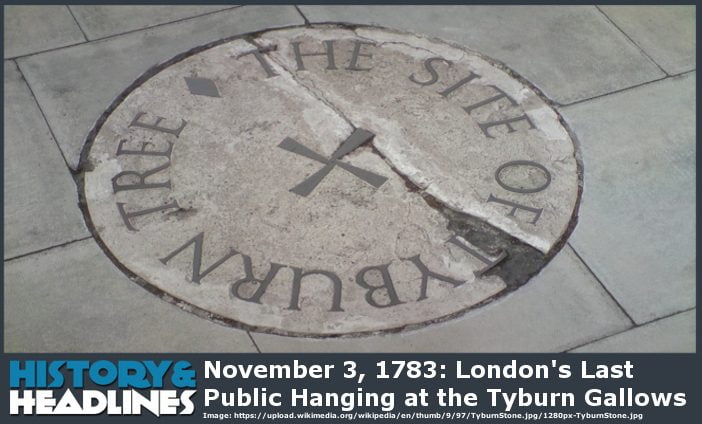A Brief History
On November 3, 1783, highwayman John Austin became the last person to be publicly hanged at London’s Tyburn gallows.
Digging Deeper
For centuries Tyburn, formerly a village, but now within the city of London, had the infamous distinction of being the principal place of execution in England’s capital for criminals, traitors, and even religious martyrs. Executions and sometimes public torture occurred in Tyburn from at least 1196 until 1783. The executed included noblemen and commoners alike of both sexes. Even the dead could be “executed” there, as was the case of notorious rebel Oliver Cromwell whose corpse was disinterred so as to be publicly mutilated as a caution to would be traitors to the monarchy.

Convicted robber John Austin would be the last man hanged at the “Tyburn Tree” before authorities disassembled these dreaded gallows. Before the execution, Austin uttered the following last words: “Good people, I request your prayers for the salvation of my departing soul. Let my example teach you to shun the bad ways I have followed. Keep good company, and mind the word of God. Lord have mercy on me. Jesus look down with pity on me. Christ have mercy on my poor soul!”
Unfortunately for him, the execution did not go smoothly. Instead of snapping his neck as intended, his noose slipped in such a way that he instead wound up choking to death. Or course, unlike certain other historical figures, given that he had not just robbed someone, but attacked his victim, cutting and wounding him, it is hard to feel too much sympathy for Austin.

Question for students (and subscribers): Is hanging a justifiable form of punishment? If so, should hangings be done in public view? Please let us know in the comments section below this article.
If you liked this article and would like to receive notification of new articles, please feel welcome to subscribe to History and Headlines by liking us on Facebook and becoming one of our patrons!
Your readership is much appreciated!
Historical Evidence
For whatever reason, we humans have an enduring fascination with executions. As such, no shortage of books cover this hanging and many others. For more information, please start with the suggestions listed below.
Fielding, Steve. The Executioner’s Bible: The Story of Every British Hangman of the Twentieth Century. John Blake, 2008.
Kellaway, Jean. The History of Torture and Execution: From Early Civilization through Medieval Times to the Present. Lyons Press, 2002.
The featured image in this article, a photograph by RioVerde of a stone marking the site of the Tyburn tree on the traffic island at the junction of Edgware Road, Bayswater Road and Oxford Street, has been released by the copyright holder of this work into the public domain worldwide.
You can also watch a video version of this article on YouTube.


